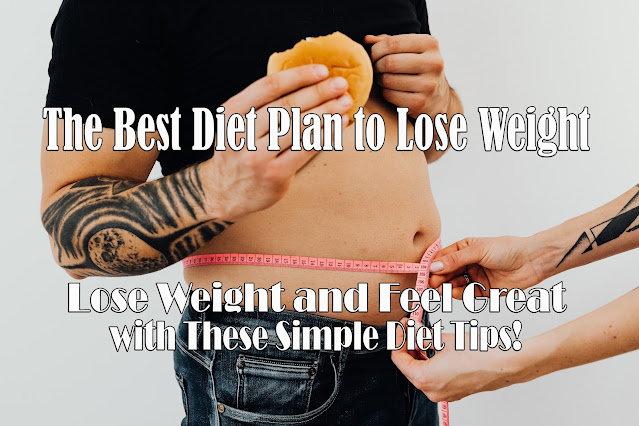Losing weight can be a challenging process, but it doesn't have to be complicated. The key to successful weight loss is to find a diet plan that is sustainable, healthy, and fits your lifestyle. With so many diets to choose from, it can be overwhelming to know which one is the best for you. In this article, we will discuss the best diet plan to lose weight, providing you with tips, strategies, and meal plans to help you achieve your weight loss goals.
1. What is the Best Diet Plan to Lose Weight?
When it comes to losing weight, there is no one-size-fits-all diet plan that works for everyone. The best diet plan to lose weight is one that is balanced, healthy, and sustainable. Here are some factors to consider when choosing a diet plan:
The Importance of a Balanced Diet
A balanced diet is essential for overall health and weight loss. A balanced diet includes a variety of foods from all food groups, such as fruits, vegetables, whole grains, lean proteins, and healthy fats.
Macronutrient Ratios for Weight Loss
The macronutrient ratio of a diet plan can play a role in weight loss. A diet high in protein and low in carbohydrates can be effective for weight loss. However, it's important to choose a diet plan that aligns with your personal goals and preferences.
Popular Diets for Weight Loss
There are many popular diets for weight loss, such as the Mediterranean diet, the ketogenic diet, and the DASH diet. These diets have been shown to be effective for weight loss, but it's important to choose a diet plan that aligns with your personal goals and preferences.
2. How to Choose the Right Diet Plan for You
Choosing the right diet plan for you can be a challenging process. Here are some factors to consider when choosing a diet plan:
Consider Your Goals and Lifestyle
When choosing a diet plan, it's important to consider your personal goals and lifestyle. For example, if you are a vegetarian, a vegetarian diet plan may be a good fit for you. If you have a busy schedule, a diet plan that includes meal prep and planning may be more sustainable.
Consult with a Healthcare Professional
Before starting a new diet plan, it's important to consult with a healthcare professional. They can provide you with personalized recommendations and ensure that the diet plan is safe and appropriate for your health needs.
Research the Diet Plan
Before starting a new diet plan, it's important to research the diet plan. Look for evidence-based information and reviews from other individuals who have tried the diet plan.
3. The Science Behind Weight Loss
Understanding the science behind weight loss can help you make informed decisions about your diet and exercise habits. Here are some key concepts to understand:
Energy Balance and Weight Loss
Weight loss is achieved when you consume fewer calories than you burn. This is known as a calorie deficit. To create a calorie deficit, you can either reduce your calorie intake or increase your physical activity levels.
The Role of Macronutrients in Weight Loss
The macronutrients in your diet - carbohydrates, proteins, and fats - play a role in weight loss. Protein can help you feel full and satisfied, while carbohydrates and fats provide energy. It's important to find a balance that works for you.
The Importance of Regular Exercise
Regular exercise is an important part of a healthy lifestyle and weight loss. Exercise can help you burn calories, increase muscle mass, and improve your overall health. Aim for at least 150 minutes of moderate-intensity exercise per week.
4. Meal Plans for the Best Diet Plan to Lose Weight
Here are some meal plans for the best diet plan to lose weight:
Meal Plan 1: Mediterranean Diet
- Breakfast: Greek yogurt with berries and nuts
- Lunch: Grilled chicken salad with vegetables and olive oil dressing
- Dinner: Baked salmon with roasted vegetables
- Snacks: Hummus with vegetables or fruit
Meal Plan 2: Low-Carb Diet
- Breakfast: Two eggs with spinach and avocado
- Lunch: Grilled chicken with mixed greens and olive oil dressing
- Dinner: Baked salmon with roasted broccoli and cauliflower rice
- Snacks: Nuts, cheese, or vegetables with hummus
Meal Plan 3: Plant-Based Diet
- Breakfast: Oatmeal with almond milk and berries
- Lunch: Tofu stir-fry with vegetables and brown rice
- Dinner: Lentil soup with mixed greens salad
- Snacks: Fresh fruit, nuts, or edamame
5. FAQs
Q: What is the best diet plan for weight loss?
A: The best diet plan for weight loss is one that is balanced, healthy, and sustainable. It's important to choose a diet plan that aligns with your personal goals and preferences.
Q: How many calories should I eat to lose weight?
A: The number of calories you should eat to lose weight depends on your age, gender, weight, height, and physical activity levels. It's important to consult with a healthcare professional to determine the appropriate number of calories for you.
Q: Do I need to exercise to lose weight?
A: While exercise is not necessary for weight loss, it can help you burn calories, increase muscle mass, and improve your overall health. Aim for at least 150 minutes of moderate-intensity exercise per week.
Conclusion
The best diet plan to lose weight is one that is balanced, healthy, and sustainable. It's important to choose a diet plan that aligns with your personal goals and preferences, and to consult with a healthcare professional before starting a new diet plan. Remember that weight loss is achieved by creating a calorie deficit, either through reducing your calorie intake or increasing your physical activity levels. With dedication and persistence, you can achieve your weight loss goals and lead a healthier, happier life.




















